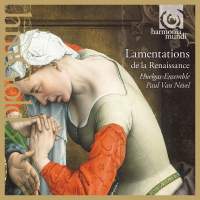Texte paru dans: / Appeared in: |
|
|
Outil de traduction (Très approximatif) |
|
|
Reviewer: David Fallows
Renaissance music for the Tenebrae constitutes an endless fund of passionate and evocative polyphony. The nature and design of the texts beautifully articulates the music, alternating the single letter that opens each section with more expansive music for the Lamentations proper and ending with the words 'Jerusalem, convertere ad Dominum Deum tuum '. There is no clear explanation why Paul van Nevel chose these four particular settings, but they do show some of the range of styles adopted across the years, opening with the little-known set by Tiburtio Massaino (published in 1599) and ending with the superb Good Friday set that is among the last works of Lassus.
The group of ten nicely balanced singers works particularly well in those two sets. The top voices are taken by performers with a splendidly directed sense of line ; and the firm basses give a clear shape to the harmonic designs. Everything is magnificently controlled, avoiding the excesses that the texts might be thought to invite and concentrating on the clarity of the polyphony.
The very
different and far more angular music of Robert White is not so securely done:
though some of the dissonances are superbly caught, there are also rather too
many nervous moments, as though the singers had not fully absorbed the music.
And for the early set by Marbrianus de Orto they rather confuse the design by
including an instrumental group: the players are wonderful, but the varied
scoring does less than full justice to the formal strength of this still
severely underperformed composer: while it is wonderful to have some music by de
Orto on disc, somehow one cannot help feeling that he deserved a better chance
than this. ~~~~~~~
Gramophone (08/2008) This is one of a special
edition revisiting some of Harmonia Mundi's notable recordings to mark its
50-year history, and fittingly this was (if memory serves) the Huelgas Ensembl's
first recording for the label. Alongside the original booklet-note by Paul Van
Nevel is a newly commissioned essay which refrains from any puffery: the label's
achievement is more effectively signalled in this issue's lavish production
values, which include a number of topical illustrations of a penitential
character, as befits the music. Van Nevel has chosen Lamentations from three of
the most important currents of Renaissance polyphony. It's interesting to hear
the White shorn of some of the churchy reverence often attending it in
recordings; while perhaps the most intriguing piece is the rarely performed set
by de Orto. It's a typically van Nevelish mix, and though not my own first pick
from his production for Harmonia Mundi, it's not a bad marker. |
|
|
|
|
|
Cliquez l'un ou l'autre
bouton pour découvrir bien d'autres critiques de CD |
|




